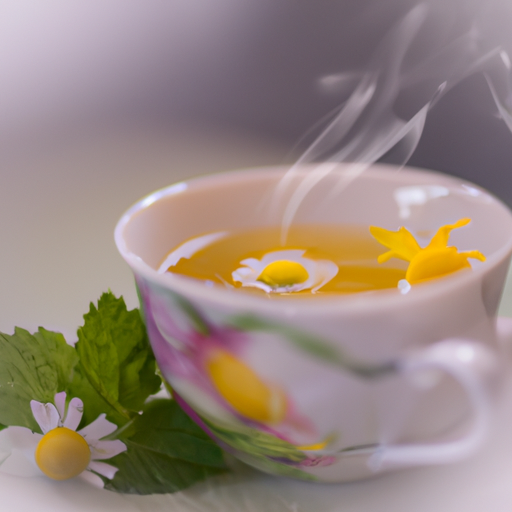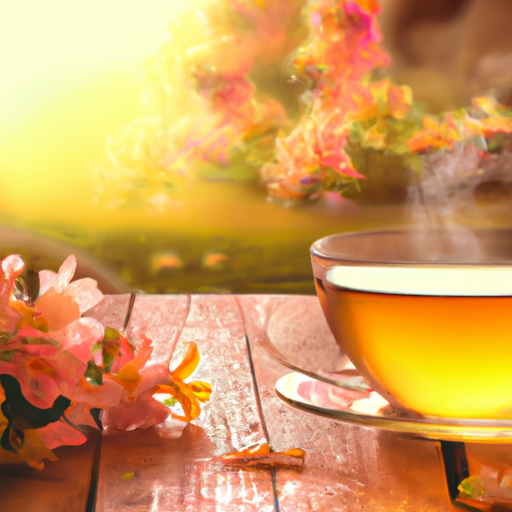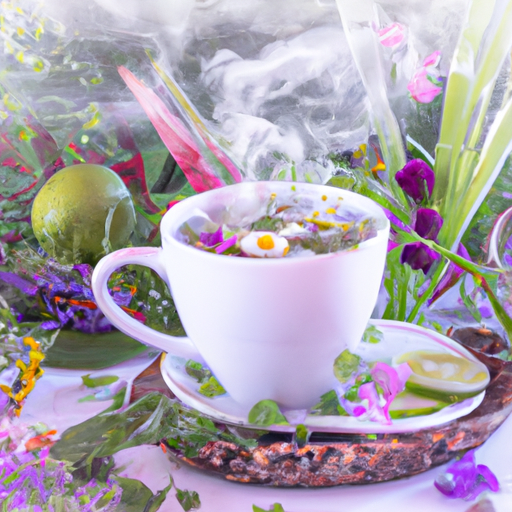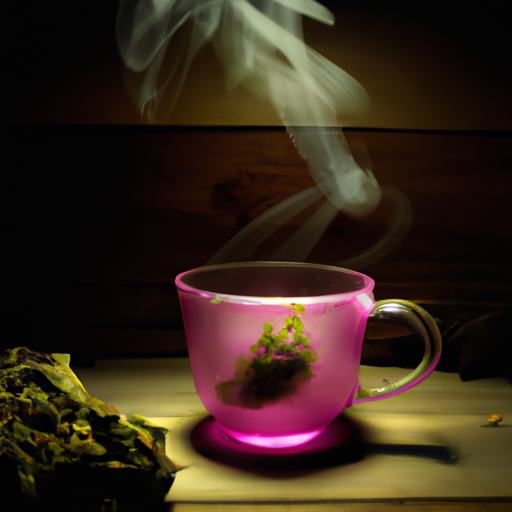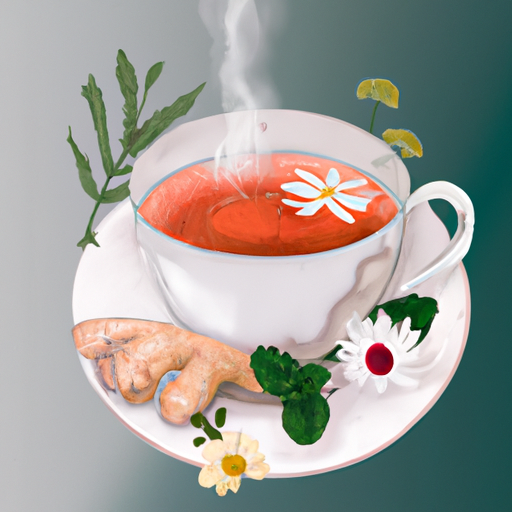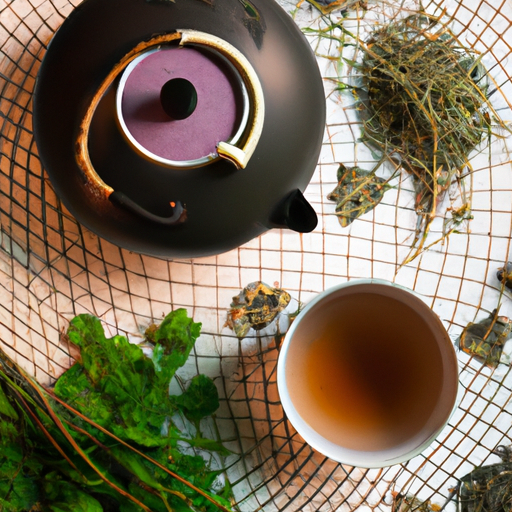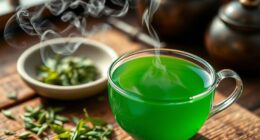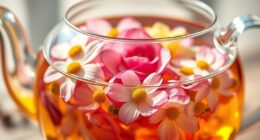Ah, the joys of a troubled stomach. The cramps, the bloating, the discomfort that makes you feel like you’ve swallowed a bowling ball. It’s enough to make you want to curl up in a ball and never eat again.
But fear not, my fellow stomach warriors, for I have a solution that is as natural as the earth itself: herbal tea. Yes, you heard me right. Something as simple as a cup of tea can work wonders for those pesky stomach problems. And not just any tea, mind you. I’m talking about herbal tea. The kind that’s made from plants and herbs that have been used for centuries to soothe and heal.
From chamomile to ginger to peppermint, there is a whole world of herbal teas out there just waiting to be sipped. So, if you’re tired of relying on over-the-counter remedies that only provide temporary relief, join me on this journey to discover the best herbal teas for stomach problems.
Your stomach will thank you.
Key Takeaways
- Chamomile tea relaxes muscles in the digestive tract and reduces inflammation, making it beneficial for stomach problems.
- Peppermint tea relaxes muscles of the gastrointestinal tract and relieves indigestion, bloating, and stomach cramps, providing relief for stomach problems.
- Ginger tea has anti-inflammatory properties and soothes upset stomach and relieves nausea, making it a good choice for stomach problems.
- Fennel tea soothes stomach problems like indigestion, bloating, and gas, making it effective for relieving stomach problems.
Chamomile Tea
Chamomile tea is an amazing remedy for soothing stomach problems. It is the go-to choice for those seeking relief. Its numerous benefits have been well-documented, making it a popular option for those suffering from digestive issues.
Chamomile tea is known for its ability to relax the muscles in the digestive tract, reducing inflammation and relieving symptoms such as bloating and cramping. Additionally, it has been shown to have a calming effect on the nervous system, which can be beneficial for those experiencing stress-related stomach problems.
To make chamomile tea, simply steep a chamomile tea bag or a teaspoon of dried chamomile flowers in hot water for about 5 minutes. Strain and enjoy!
Now, let’s move on to the next herbal tea that can help with stomach problems – peppermint tea.
Peppermint Tea
Peppermint tea, with its refreshing and soothing qualities, can transport you to a peaceful garden oasis. This delightful herbal tea not only offers a pleasurable taste, but it also provides numerous benefits for stomach problems. The natural compounds found in peppermint, such as menthol, have been shown to relax the muscles of the gastrointestinal tract, relieving symptoms of indigestion, bloating, and stomach cramps.
To make peppermint tea, simply steep a handful of fresh peppermint leaves or a peppermint tea bag in hot water for about 5-10 minutes. Add a touch of honey or lemon if desired. Sip on this aromatic brew after meals or whenever your stomach needs some gentle care.
Transitioning to our next topic, let’s explore the wonders of ginger tea and its healing properties.
Ginger Tea
Ginger tea, with its spicy and invigorating aroma, can transport you to a bustling spice market. Here are three reasons why ginger tea is great for your stomach problems:
-
Health benefits of ginger tea: Ginger is known for its anti-inflammatory properties, which can help reduce stomach inflammation and alleviate digestive issues like indigestion and bloating. It can also soothe an upset stomach and relieve nausea.
-
How to make a soothing cup of ginger tea: Start by peeling and slicing fresh ginger root. Boil water and add the ginger slices, letting it steep for about 10 minutes. You can add honey or lemon for extra flavor. Sip on this warm and comforting drink to ease stomach discomfort.
-
Ginger tea is natural and holistic: Instead of relying on medication, ginger tea offers a natural remedy for stomach problems. Its therapeutic properties have been used for centuries in traditional medicine.
Transitioning into the next section about fennel tea, let’s explore another herbal tea that can provide relief for stomach issues.
Fennel Tea
To alleviate discomfort and promote digestive health, you can try sipping on a warm and aromatic cup of fennel tea. Fennel tea is known for its numerous benefits, including soothing stomach problems such as indigestion, bloating, and gas. It contains compounds that have anti-inflammatory properties and can help relax the muscles in the gastrointestinal tract, easing digestion.
To make fennel tea, simply steep one teaspoon of crushed fennel seeds in a cup of hot water for about 10 minutes. You can add a touch of honey or lemon for flavor if desired.
Fennel tea is a natural and holistic remedy that has been used for centuries to support digestive wellness. Its gentle yet effective properties make it an excellent choice for those seeking relief from stomach issues.
Moving forward, let’s explore the benefits and preparation of licorice root tea.
Licorice Root Tea
Licorice root tea, with its distinctive flavor and potential health benefits, offers a unique option for those looking to support their digestive system. Licorice root has been used for centuries in traditional medicine to alleviate various digestive issues. It contains compounds that have been shown to have anti-inflammatory and antioxidant properties, which can help soothe the digestive tract and reduce inflammation.
Licorice root also has a demulcent effect, meaning it forms a protective layer on the stomach lining, potentially helping to relieve symptoms of acid reflux and gastritis. Additionally, licorice root may help stimulate the production of mucus, which can aid in digestion and protect the stomach lining.
When combined with other digestive herbs like peppermint and ginger, licorice root can create a potent blend that supports overall digestive health.
Peppermint and Ginger Blend
I personally find that the Peppermint and Ginger Blend is a fantastic herbal tea for stomach problems. This blend combines the benefits of both herbs, allowing for maximum relief.
Not only does it provide soothing relief, but it also offers a refreshing and invigorating flavor that I find quite enjoyable.
Combines the Benefits of Both Herbs for Maximum Relief
By blending the healing properties of both peppermint and ginger together, this herbal tea works like a soothing balm for your troubled stomach. Peppermint is known for its ability to relax digestive muscles, reducing bloating and discomfort. Ginger, on the other hand, has anti-inflammatory properties that can calm an upset stomach and alleviate nausea.
When combined, these two herbs create a powerful blend that provides maximum relief for stomach problems. Not only does this herbal tea address the root causes of digestive issues, but it also provides a refreshing and soothing flavor. The cool, minty taste of peppermint is complemented by the spiciness of ginger, resulting in a delicious and comforting beverage.
So, if you’re looking for a natural way to ease your stomach problems, try this delightful herbal tea blend.
Provides a Refreshing and Soothing Flavor
Blending the cooling essence of peppermint with the spicy kick of ginger creates a harmonious and soothing flavor experience. This combination not only provides a refreshing flavor but also offers numerous health benefits.
Peppermint is known for its calming effects on the stomach, helping to alleviate symptoms such as indigestion and bloating. On the other hand, ginger has been used for centuries to relieve nausea and aid digestion. Together, these herbs work in synergy to provide maximum relief for stomach problems.
In addition to its soothing properties, this herbal tea can also uplift your senses with its invigorating aroma and taste. The refreshing flavor can help to relax your mind and promote a sense of well-being.
As we transition into the discussion of lemon balm tea, it’s important to note that this blend is just one of the many herbal remedies available for stomach problems.
Lemon Balm Tea
Lemon Balm Tea is a soothing choice for those experiencing stomach discomfort. I’ve personally found it to be a natural remedy that provides relief and relaxation. This herbal tea has numerous benefits for the stomach and overall well-being.
Here are some reasons why lemon balm tea is beneficial for stomach problems:
-
Calms digestive distress: Lemon balm contains compounds that can help reduce bloating, gas, and indigestion.
-
Eases stomach cramps: The antispasmodic properties of lemon balm can help alleviate stomach cramps and discomfort.
-
Reduces nausea: Lemon balm has traditionally been used to ease nausea and vomiting, making it a great choice for those with an upset stomach.
-
Promotes digestion: This refreshing tea can stimulate the production of digestive enzymes, aiding in the digestion process.
-
Easy preparation: To make lemon balm tea, simply steep 1-2 teaspoons of dried lemon balm leaves in hot water for 5-10 minutes. Add honey or lemon for extra flavor if desired.
Incorporating lemon balm tea into your routine can be a comforting and natural way to support your stomach health.
Frequently Asked Questions
Are there any potential side effects or risks associated with consuming herbal teas for stomach problems?
There can be potential long-term effects and interactions with other medications when consuming herbal teas for stomach problems. It is important to consult with a healthcare professional for personalized advice.
Can pregnant women or individuals with certain medical conditions safely consume these herbal teas?
During pregnancy or if you have certain medical conditions, it’s important to take precautions when consuming herbal teas. Consult with a healthcare professional for safe alternatives that are appropriate for your specific situation.
How long should one steep the herbal tea for maximum effectiveness in relieving stomach problems?
For maximum effectiveness in relieving stomach problems, steep herbal tea like a patient gardener tending to seeds. Different herbal teas have varying steeping times, each offering unique benefits for soothing the stomach naturally.
Are there any specific guidelines on the recommended dosage or frequency of consuming these herbal teas?
In terms of recommended dosage and frequency of consumption, it is important to consult with a healthcare professional or herbalist. They can provide personalized guidance based on your specific needs and health conditions.
Can these herbal teas be consumed alongside other medications or treatments for stomach problems?
Yes, herbal teas can be consumed alongside other medications or treatments for stomach problems. However, it is important to consult with a healthcare professional to ensure there are no interactions with prescription drugs and to assess their effectiveness compared to traditional treatments.
Conclusion
In conclusion, when it comes to finding relief for stomach problems, herbal teas can be a natural and effective option.
Chamomile tea, with its calming properties, is like a gentle hug for your stomach.
Peppermint tea, with its soothing and cooling effects, is like a breath of fresh air for your digestive system.
Ginger tea, with its anti-inflammatory properties, is like a warm embrace for your stomach.
Fennel tea, licorice root tea, peppermint and ginger blend, and lemon balm tea are other herbal teas that can provide relief.
So why not give these natural remedies a try and give your stomach the nurturing it deserves?

